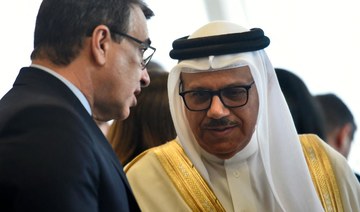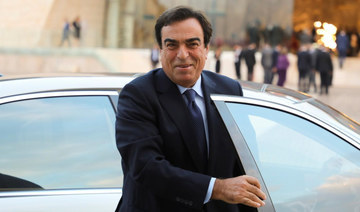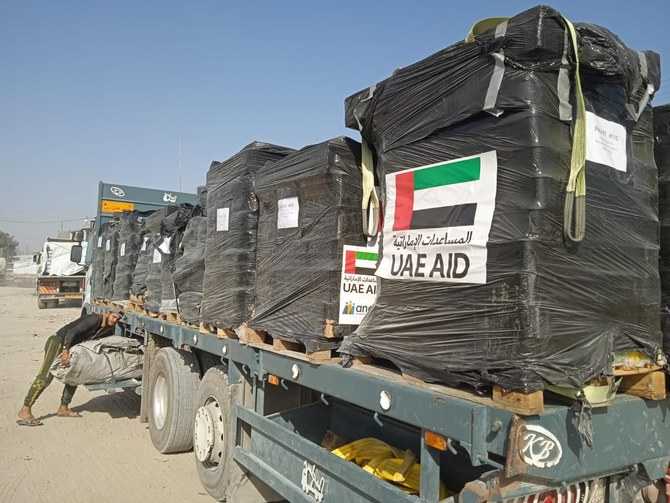BEIRUT: Lebanese Prime Minister Najib Mikati stressed the government’s commitment to implementing international resolutions and maintaining security and stability, as a US congressional delegation stressed the need to end political disagreements and focus on addressing the country’s economic and social crises.
Mikati expressed his appreciation for the US standing by Lebanon’s side and supporting the army. The delegation said it stood by Lebanon and supported the government.
President Michel Aoun told the visiting delegation that Lebanon had begun its journey out of the severe economic crisis by setting a program for negotiations with the International Monetary Fund and reforms of the financial and banking systems.
Mikati announced on Friday that he would soon call for a Cabinet session to discuss more than 100 items on the Cabinet’s agenda.
Observers are counting on a meeting that will bring together Aoun, Parliament Speaker Nabih Berri and Mikati on the sidelines of Monday’s Independence Day commemorations to make a breakthrough in the political crisis.
Labor Minister Mustafa Bayram said on Saturday: “There are positive signs that suggest that we are facing a real opportunity for an appropriate solution to hold Cabinet sessions again.”
But he made it clear that he could not talk about Information Minister George Kordahi, who has angered Gulf states, including Saudi Arabia, with his comments on the war in Yemen and his refusal to resign over them.
“We support any solution that preserves Lebanon's ties, interests and sovereignty,” said Bayram. “We learned that Kordahi is ready to do what is in Lebanon’s best interest, through dialogue.”
Hezbollah has thwarted Mikati’s many attempts to hold Cabinet sessions, which have been suspended since Oct. 12, and several Hezbollah officials have stressed that the party stands firm in its conditions.
The party is refusing to make any efforts to resolve Lebanon's diplomatic and economic fallout with the Gulf states and insists on dismissing Judge Tarek Bitar, who is leading the investigation into the Beirut port blast.
Zafer Nasser, secretary-general of the Progressive Socialist Party headed by Walid Jumblatt, told Arab News: “The party has no information about a close political solution to the crises that Lebanon is experiencing. While we agree on the need to separate government and judiciary, it seems that the Shiite duo, i.e. Hezbollah and the Amal Movement, are insisting that the Cabinet should not convene before Bitar is removed, since Hezbollah believes the investigations are leading to implicate it in the Beirut port blast, regardless of whether or not this is true.”
Nasser said regional solutions were required to bridge the rift between Lebanon and the Gulf states, but that regional understandings had not yet been fruitful.
In a statement on Friday evening, Hezbollah’s deputy secretary-general Sheikh Naim Qassem demanded finding a solution for the entire judicial system, meaning the removal of Judge Suhail Abboud as the head of the Supreme Judicial Council.
“The judicial scene in Lebanon is unhealthy,” Qassem said. This has nothing to do with a certain incident or a specific judge. This is about an entire judicial system that overlaps in an unusual way, and it must be reconsidered — a solution must be found.”
Sheikh Nabil Kaouk, head of Hezbollah's Executive Council, said Saturday there was a “real opportunity” to resolve the Cabinet impasse and that those concerned should not waste it.
Lebanese Foreign Minister Abdullah Bou Habib has traveled to Moscow where he plans to meet his Russian counterpart Sergey Lavrov on Monday.
The ministers are expected to discuss the issue of Syrian refugees and Russian aid, Russia's mediation to solve Lebanon's crises, and the possibility of employing Russian investments in the country.
Almarkazia news agency quoted a diplomatic source as saying: “Russia will consider the possibility of mediating between Lebanon and the Gulf states, but it would not like to take the issue upon itself and bear the consequences should its efforts fail.”
Bou Habib will be receiving satellite images from the day of the Beirut port explosion, upon Lebanon's request. Russia's space agency Roscosmos sent the images to Lavrov so he could hand them over to Bou Habib.
Mikati is scheduled to head to the Vatican on Wednesday to meet Pope Francis.




























